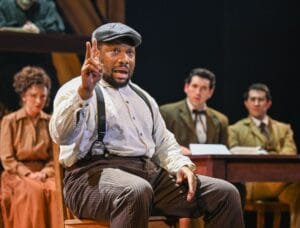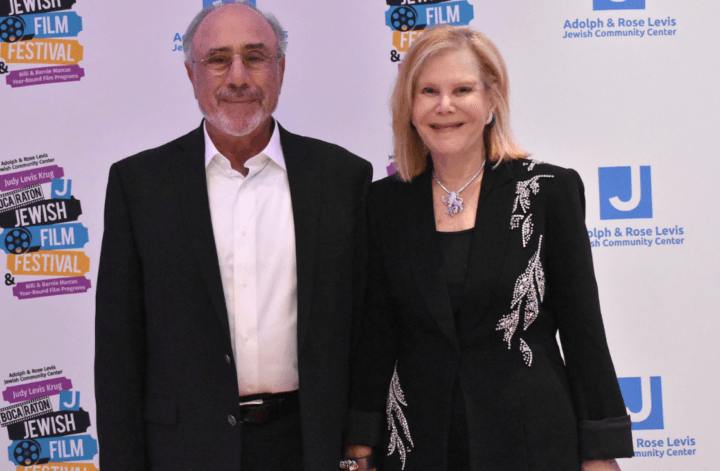Political greed, ruthless ambition, ignoring “facts” to sell a popular story, and always – everywhere and in every age – deep-seated antisemitism lie at the heart of PARADE. This blockbuster, emotionally-charged musical (co-conceived and directed on Broadway by Harold Prince), shook the conscience of our nation in 1999. It went on to win Tony Awards for Best Score (by Jason Robert Brown who also wrote the lyrics), Best Book of a Musical (by Alfred Uhry), along with five Drama Desk Awards (including Outstanding Musical) and The New York Drama Critics Circle Award for Best Musical.
And the awards kept coming. For the 2023 Broadway Revival, “Parade” claimed two Tonys, including Best Revival of a Musical, two Outer Critics Circle Awards, and a Drama Desk Award. Our current “local” revival, mounted by award-winning director/choreographer Patrick Fitzwater, co-founder, and artistic director of highly acclaimed Slow Burn Theatre Company, is a not-to-be-missed theatrical experience that will leave you shocked, shaken, but also hopeful about the power of love and goodness that may feel somewhat bruised, but still dwells among us.
“Parade”’s plot centers on the plight of a young, newlywed Jewish couple trying to make a life for themselves in the Jim Crow South. College-educated, Yiddish-spouting Leo Frank (Justin Albinder) from Brooklyn accepts a well-paying position from his southern wife’s uncle as superintendent of the National Pencil Company in Atlanta, Georgia. He’s conscientious, dedicated to his work, but socially like a fish out of water. Though the year is 1913, the Confederate past is still very much a source of pride in “The Old Red Hills of Home,” with the titular annual Confederate Memorial Day Parade mirroring the drum beats of the musical’s Civil War opening scene in Marietta. (Both scenes feature a sweetly innocent, young couple at the cusp of their greatest trauma.)
Leo’s wife, Atlanta native Lucille (Mikayla Cohen) looks forward to a picnic in the park to watch the parade, but her Yankee husband can’t stomach the hypocrisy. “Who would want to celebrate losing a war?” he states. Leo goes on to detail his frustration with southern values, including notably differing Jewish identities, with: “For the life of me I can’t understand how God created southern Jews and northern Jews at the same time!” (For those of us who recall seeing Alfred Uhry’s 1996 dramedy,“The Last Night of Ballyhoo,” set in 1939 Atlanta, things hadn’t changed much decades on.) Leo sings of his discomfort in “How Can I Call This Home?”
And so he decides to head to work on the Confederate holiday, thoughtlessly spoiling Lucille’s picnic plans. If only he’d considered his wife’s feelings and not gone to the office.… We wouldn’t have this tragic, true story, and its rapturously beautiful musical portrayal. As in Lucille’s response, singing “Leo at Work”/”What Am I Waiting For” featuring Leo, Lucille and Ensemble.
Slow Burn specializes in presenting lesser-produced, outstanding musical theater and the vocal and performance talent of their ensembles are legendary. They also have a knack for discovering outstanding leads. Mikayla Cohen, who plays Lucille, has the most beautiful singing voice and an incredible vocal range. I raved about her first Slow Burn appearance where she starred as Anya/Anastasia in their past hit production. When I mentioned that fact to some audience members during intermission, who’d also seen “Anastasia,” they had no idea it was the same person. Cohen had so completely transformed herself from Russian princess to southern Jewish wife. Still, her voice projects as gloriously as ever!

Now NYC-based and internationally starring actor and dialect coach Justin Albinder is making his Slow Burn debut as Leo Frank. Well that would explain his period-perfect Brooklyn-Jewish accent! Albinder also boasts many musical theater credits and offers a finely nuanced portrayal of the nerdy, frightened, male-chauvinist intellectual who slowly transforms into a solicitous husband deeply in love with and grateful for his incredible wife. Leo takes the stand, literally, and stands up for himself in the moving, “It’s Hard to Speak My Heart.” In a gut-wrenching late scene, he forcefully recites the iconic Hebrew prayer of “Sh’ma.” Only minutes earlier, when love and hope still sprung eternal despite “together time” lost, his impressive voice had joined Lucille’s in their final duet, “All the Wasted Time.”
The musical’s pivotal plot point is the tragic rape and murder of 13-year-old factory worker Mary Phagan (Jessica Balton), leading to the arrest and trial of factory manager Leo Frank, “chosen” as the preferred of two suspects. Even after death, Jessica Balton continues to provide a credible depiction of young Mary as a constant looming presence. Her first innocent appearance is in a lovely duet, “The Picture Show,” with Frankie (Joel Hunt), who morphs from a happy-go-lucky flirt, to angry, revenge-hungry young man).
On the trolley ride home, Mary declines Frankie’s invite to take her to the picture show, saying her mother feels she’s too young to be dating, and instead heads to the factory to collect her pay. At Leo Frank’s trial, we learn that Mary’s suddenly widowed mother was forced to pull her out of school in Marietta and move to Atlanta so the girl could help support the family with her low-wage factory job. Ana Marie Calise, as grieving Mrs. Phagan, makes full use of her stunning vocals on the witness stand in “My Child Will Forgive Me.”
And thus due to a young girl’s coincidental encounter with a rapist/murderer, followed by the ugliest possible selfish and prejudiced instincts in human nature, two innocent lives are lost, the KKK (Klu Klux Klan) is mightily resurrected and B’nai Brith establishes the ADL (Anti Defamation League) to fight antisemitism and all forms of bigotry and injustice.
But I’m getting way ahead in the story. Two years pass from the arrest of an innocent man, and his being railroaded by a judge, prosecutor, and the sensationalist press for personal and political gain. A last-minute career-ending reprieve by the state’s governor still can’t stop the blind hatred of a lynching mob driven by the unscrupulous prosecutor who’d bought and pressured false condemning narratives for a win that would enhance his personal political ambitions. Based on no evidence, he nonchalantly decided to accuse the “outsider” Jew because “hanging another nigra ain’t enough this time. We gotta do better.”

Riley, testifies in court. Photo by Larry Marano.
Sadly, it was the pencil factory’s night watchman, Newt Lee (Chaz Rose), who actually committed the rape/murder but was incentivized to falsely point to his boss. Then prosecutor Dorsey makes a deal with factory janitor Jim Conley (also portrayed by Chaz Rose) to fabricate an eye witness account when he discovers he’s a wanted felon who’d escaped a chain gang. We are all astounded by Chaz Rose’s uniquely deep, powerful voice that makes everyone sit up and applaud his quick, lying rendition of events at the trial with “That’s What He Said,” in Act I. Followed by the incredibly evocative Conley and Chain Gang lament, “Blues: Feel the Rain Fall,” in Act II.
Among frequently appearing villains are corrupt prosecutor Hugh Dorsey (Kevin Patrick Martin), insisting “Something Ain’t Right,” who would later replace the more honest Slaton as governor of Georgia. And right wing, antisemitic newspaperman Tom Watson (Landon Summers), who does a frighteningly memorable turn in “Hammer of Justice,” is later elected to the US Senate. All true, and just goes to show that compassion and honesty does not translate into winning elections – not then, and often not now.
Couples of all sorts are rather prominent in this story. One more “nice” couple is Governor John Slaton (Michael Materdomini) who’s often found waltzing with (and consulting) his wife, Sally (Allyson Rosenblum). Popular Slow Burn regular Michael Materdomini perfectly portrays the governor with expected bravado and forcefulness but ultimately soul-searching humanity. At Lucille’s unstoppable insistence he reopens Leo’s case, especially looking into witness testimonies, all proven to be prosecutor-induced lies.
In “A Rumblin’ and a Rollin’,” two Black domestic workers – Chaz Rose as Riley and Kareema Khouri as Angela (not exactly a couple, but with similar experiences) – reflect how the death of one white girl has the whole town in a tizzy while frequent lynchings of their brethren go unnoticed.
Many of you may be familiar with the general outline of the Leo Frank case; details and repercussions arrive as shocks to the system nonetheless. (Historically, similar unpublicized judicial abuse was far too common.) Yet through it all, in the most dire of circumstances, we witness a tender, growing love between the embattled couple with Lucille taking charge, for once, and proving to be a most able and determined advocate for her husband. Their relationship only serves to heighten the contrast between the forces of good and evil while putting a face on the horrible repercussions of systemic hatred, prejudice, and antisemitism.
If ever there was a need, yet again, to combat the scourge of antisemitism, it is today. According to esteemed historian, Lynne University Distinguished Professor of American History, prolific author and our most popular local lecturer, Prof. Robert Watson, PhD.: Hate crimes had been dropping in the US till a sudden spike in 2016 with numbers increasing yearly to the point where there are 1,500 armed and active hate groups in America today, including the KKK and neo-Nazis, neo-Confederates, and White Supremacists.
Why turn this horrific incident into a musical? It’s been said that music soothes the savage beast and touches our souls like nothing else. It’s where our deepest memories lie … and maybe a direct line to our hearts. The play opens to beating drums of the Confederacy, calling Atlanta’s troops to war. It ends with the drum rolls of yet another annual Confederate Memorial Day Parade. Throughout, we enjoy composer and lyricist Jason Robert Brown’s incredibly beautiful, moving and varied musical numbers that best reflect each scene’s atmosphere – be that pop rock, folk, rhythm and blues, or gospel.

celebrate a picnic together, albeit in prison, as they embrace with newfound love and
respect by singing, “All the Wasted Time.” Photo by Larry Marano.


